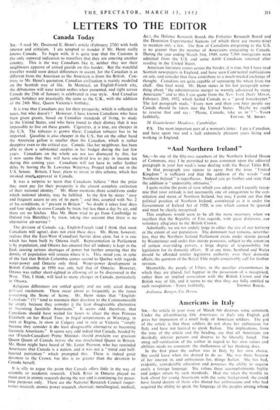"And Northern Ireland"
Sitt,—As one of the fifty-two members of the Northern Ireland House of Commons, may I be permitted to pass comment upon the editorial paragraph in your last week's issue dealing with the Royal Titles Bill.
In that paragraph you appear to agree that the term "United Kingdom" is sufficient and that the addition of the words "and Northern Ireland" is superfluous. Indeed you go further and state that the addition is "undesirably obtrusive."
I quite realise the point of view which you adopt, and I equally recog- nise that your attitude is not necessarily one of antagonism to the con- stitution and status of Northern Ireland, but may I point out that the political position of Northern Ireland, constituted as it is under the Government of Ireland Act of 1920, is one which cannot he ignored and must be clearly recognised.
This emphasis would seem to be all the more necessary when we recollect that the Republic of Eire regards, with great disfavour, our voluntary allegiance to the British Crown. Admittedly, we are not unduly large in either the size of our territory or the extent of our population. The. dominant fact remains, neverthe- less, that the Northern Ireland Parliament exists under statute passed by Westminster and under that statute possesses, subject to the retention of certain over-riding powers, a large degree of responsibility for legislation for its domestic affairs. If at any time. Scotland and Wales should be afforded similar legislative authority over their domestic affairs, the question of the Royal Title might conceivably call for further revision.
Meanwhile, the people of Ulster, in the peculiar circumstances in which they are placed, feel happier in the possession of a recognised, rather than an implied association with the British Crown and the British way of life, and it seems to me that they are fully entitled to
such recognition.—Yours faithfully, THOMAS BAILIE.
Ardmara, Bangor, Co. Down.


































 Previous page
Previous page